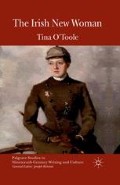Abstract
New Woman writers are not usually credited with producing innovative work in the field of migrant writing, and yet George Egerton’s vision of a new translocational subject resonates with recent scholarship in the fields of migration and diaspora studies. As a migrant who settled in a number of different countries herself, she experienced first-hand the disruption of the binaries between home and adopted country. In her semi-autobiographical novel, The Wheel of God, these disruptions come to the fore and illuminate a commitment to what Braidotti terms ‘nomadic subjectivity’.1
Access this chapter
Tax calculation will be finalised at checkout
Purchases are for personal use only
Preview
Unable to display preview. Download preview PDF.
Notes
Rosi Braidotti, Nomadic Subjects: Embodiment and Sexual Difference in Contemporary Feminist Thought. (New York: Columbia Cambridge University Press, 1994), p. 24.
For instance, see Mary J. Hickman, ‘Diaspora Space and National (Re) Formations’, Éire-Ireland 47 (1, 2) (2012): 19–44.
Diane Negra, The Irish in US? Irishness, Performativity and Popular Culture (London and Durham: Duke University Press, 2006), p. 1.
See Floya Anthias, ‘Thinking Through the Lens of Translocational Positionality’, Translocations 4 (1) (2008): 5–20.
Iain Chambers. Migrancy (London: Routledge, 1994), p. 5.
George Egerton, The Wheel of God (London: Grant Richards, 1898), p. 73.
Terence de Vere White, A Leaf from the Yellow Book: the Correspondence of George Egerton (London: Richards Press, 1958), p. 12.
Breda Gray, Women and the Irish Diaspora (London: Routledge, 2004), p. 91.
For more on Tweedie, see Anka Ryall, ‘Literary Culture on the Margins: Ethel Tweedie’s Travels in Norway’ in Anglo-Scandinavian Cross-Currents, eds Inga-Stina Ewbank, Olav Lausund and Bjørn Tysdahl (London: Norvik Press, 1999): 319–30.
Ola Hansson (1860–1925), Swedish novelist, short story writer, and essayist. Originally a poet from the Skåne group, his early poetry collections Dikter (1884) and Notturno (1885) are heavily influenced by aestheticism and mysticism. In 1887, he published his best-known work, a collection of short stories, Sensitiva Amorosa, which was an exploration of the erotic in its many forms. This work caused controversy at home and abroad, particularly because of its depiction of homoerotic experience. His wife, Laura Marholm Hansson, included a description of George Egerton in her collection Modern Women: Six Psychological Sketches, (London: John Lane, 1896). For further information, see Alrik Gustafson, A History of Swedish Literature (Minneapolis: Minnesota UP, 1971), pp. 281–93.
Recent work underlines the Nietzschean aspects of Egerton’s work. See Daniel Brown ‘George Egerton’s Keynotes: Nietzschean Feminism and Fin-de-Siècle Fetishism’, Victorian Literature and Culture 39 (2011): 143–66;
Elke D’hoker, ‘Half-Man or Half-Doll: George Egerton’s Response to Friedrich Nietzsche’, Women’s Writing 18 (4) (2011): 524–46.
Egerton, ‘A Little Grey Glove’ in Keynotes (London: Elkin Mathews and John Lane, 1893), p. 97. Subsequent references to ‘A Little Grey Glove’ will be made by page number in the body of the text.
Laura Chrisman, ‘Empire, “Race” and Feminism at the Fin de Siècle: the Work of George Egerton and Olive Schreiner’ in Cultural Politics at the Fin de Siècle, eds Sally Ledger and Scott McCracken (Cambridge: Cambridge University Press, 1995), p. 48.
Scott McCracken, ‘A Novel from/on the Margins: George Egerton’s Wheel of God’ in Gender and Colonialism, eds Timothy [Tadhg] Foley, et al. (Galway: Galway University Press, 1995), p. 146. Chrisman’s article was also published in 1995, in a collection co-edited by McCracken, hence my suggestion that his essay was written as a response to hers.
Patrick Ward, Exile, Emigration and Irish Writing (Dublin: Irish Academic Press, 2002), p. 158.
Hasia Diner, Erin’s Daughters in America (Baltimore: John’s Hopkins University Press, 1983), p. xiv.
Lyn Pykett, Engendering Fictions: the English Novel in the Early Twentieth Century. (London: Edward Arnold 1995), p. 73.
Gerd Bjørhovde, Rebellious Structures (Oslo: Norwegian University Press, 1987), p. 135.
Kate Krueger Henderson, ‘Mobility and Modern Consciousness in George Egerton’s and Charlotte Mew’s Yellow Book Stories’, English Literature in Transition 54 (2) (2011): 185–211.
Lyn Pykett, ‘Portraits of the New Woman as Irish Girl: Nation and Narration at the Fin de Siècle’. Conference Paper, ‘Women Writers of the Fin de Siècle’ Conference, Birkbeck College, University of London, 29 June 2010.
George O’Brien, ‘The Aesthetics of Exile’, eds Liam Harte and Michael Parker, Contemporary Irish Fiction (Basingstoke: Macmillan, 2000), p. 52.
Author information
Authors and Affiliations
Copyright information
© 2013 Tina O’Toole
About this chapter
Cite this chapter
O’Toole, T. (2013). The Transnational New Woman. In: The Irish New Woman. Palgrave Studies in Nineteenth-Century Writing and Culture. Palgrave Macmillan, London. https://doi.org/10.1057/9781137349132_7
Download citation
DOI: https://doi.org/10.1057/9781137349132_7
Publisher Name: Palgrave Macmillan, London
Print ISBN: 978-1-349-33938-9
Online ISBN: 978-1-137-34913-2
eBook Packages: Palgrave Literature CollectionLiterature, Cultural and Media Studies (R0)

